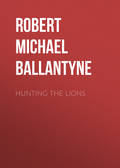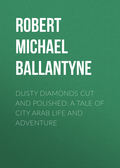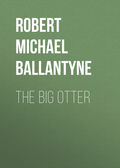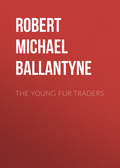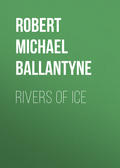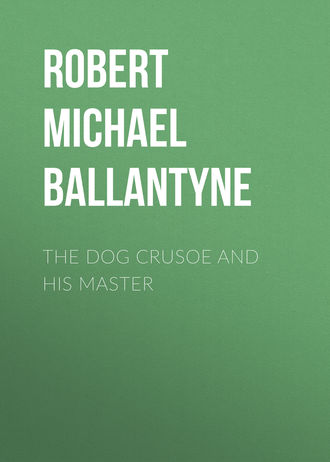
Robert Michael Ballantyne
The Dog Crusoe and his Master
“Good dog; thank’ee, my pup,” said Dick, patting Crusoe’s head as he stooped to brush the dust from his leggings; “I don’t know what would ha’ become o’ me but for your help, Crusoe.”
Crusoe turned his head a little to one side, wagged his tail, and looked at Dick with an expression that said quite plainly, “I’d die for you, I would—not once, or twice, but ten times, fifty times if need be—and that not merely to save your life, but even to please you.”
There is no doubt whatever that Crusoe felt something of this sort. The love of a Newfoundland dog to its master is beyond calculation or expression. He who once gains such love carries the dog’s life in his hand. But let him who reads note well, and remember, that there is only one coin that can purchase such love, and that is kindness; the coin, too, must be genuine. Kindness merely expressed will not do, it must be felt.
“Hallo! boy, ye’ve bin i’ the wars!” exclaimed Joe, raising himself from his task as Dick and Crusoe returned.
“You look more like it than I do,” retorted Dick, laughing.
This was true, for cutting up a buffalo carcase with no other instrument than a large knife is no easy matter. Yet western hunters and Indians can do it without cleaver or saw, in a way that would surprise a civilised butcher not a little. Joe was covered with blood up to the elbows. His hair, happening to have a knack of getting into his eyes, had been so often brushed off with bloody hands, that his whole visage was speckled with gore, and his dress was by no means immaculate.
While Dick related his adventure, or mis-adventure with the bull, Joe and Henri completed the cutting out of the most delicate portions of the buffalo, namely, the hump on its shoulder—which is a choice piece, much finer than the best beef—and the tongue, and a few other parts. The tongues of buffaloes are superior to those of domestic cattle. When all was ready the meat was slung across the back of the pack-horse, and the party, remounting their horses, continued their journey, having first cleansed themselves as well as they could in the rather dirty waters of an old wallow.
“See,” said Henri, turning to Dick and pointing to a circular spot of green as they rode along, “that is one old dry waller.”
“Ay,” remarked Joe, “after the waller dries, it becomes a ring o’ greener grass than the rest o’ the plain, as ye see. ’Tis said the first hunters used to wonder greatly at these myster’ous circles, and they invented all sorts o’ stories to account for ’em. Some said they wos fairy-rings, but at last they comed to know they wos nothin’ more nor less than places where buffaloes wos used to waller in. It’s often seemed to me that if we knowed the raisons o’ things we wouldn’t be so much puzzled wi’ them as we are.”
The truth of this last remark was so self-evident and incontrovertible that it elicited no reply, and the three friends rode on for a considerable time in silence.
It was now past noon, and they were thinking of calling a halt for a short rest to the horses and a pipe to themselves, when Joe was heard to give vent to one of those peculiar hisses that always accompanied either a surprise or a caution. In the present case it indicated both.
“What now, Joe?”
“Injuns!” ejaculated Joe.
“Eh! fat you say? ou is de?”
Crusoe at this moment uttered a low growl. Ever since the day he had been partially roasted he had maintained a rooted antipathy to Red-men. Joe immediately dismounted, and placing his ear to the ground listened intently. It is a curious fact that by placing the ear close to the ground sounds can be heard distinctly which could not be heard at all if the listener were to maintain an erect position.
“They’re arter the buffalo,” said Joe, rising, “an’ I think it’s likely they’re a band o’ Pawnees. Listen an’ ye’ll hear their shouts quite plain.”
Dick and Henri immediately lay down and placed their ears to the ground.
“Now, me hear noting,” said Henri, jumping up, “but me ear is like me eyes; ver’ short-sighted.”
“I do hear something,” said Dick as he got up, “but the beating o’ my own heart makes row enough to spoil my hearin’.”
Joe Blunt smiled. “Ah! lad, yer young an’ yer blood’s too hot yet, but bide a bit; you’ll cool down soon. I wos like you once. Now, lads, what think ye we should do?”
“You know best, Joe.”
“Oui, nodoubtedly.”
“Then wot I advise is that we gallop to the broken sand hillocks ye see yonder, get behind them an’ take a peep at the Red-skins. If they are Pawnees we’ll go up to them at once; if not, we’ll hold a council o’ war on the spot.”
Having arranged this they mounted and hastened towards the hillocks in question, which they reached after ten minutes’ gallop, at full stretch. The sandy mounds afforded them concealment, and enabled them to watch the proceedings of the savages in the plain below. The scene was the most curious and exciting that can be conceived. The centre of the plain before them was crowded with hundreds of buffaloes, which were dashing about in the most frantic state of alarm. To whatever point they galloped they were met by yelling savages on horseback, who could not have been fewer in numbers than a thousand—all being armed with lance, bow, and quiver, and mounted on active little horses. The Indians had completely surrounded the herd of buffaloes, and were now advancing steadily towards them, gradually narrowing the circle, and, whenever the terrified animals endeavoured to break through the line, they rushed to that particular spot in a body, and scared them back again into the centre.
Thus they advanced until they closed in on their prey, and formed an unbroken circle round them, whilst the poor brutes kept eddying and surging to and fro in a confused mass, hooking and climbing upon each other, and bellowing furiously. Suddenly the horsemen made a rush, and the work of destruction began. The tremendous turmoil raised a cloud of dust that obscured the field in some places, and hid it from our hunters’ view. Some of the Indians galloped round and round the circle, sending their arrows whizzing up to the feathers in the sides of the fattest cows. Others dashed fearlessly into the midst of the black heaving mass, and, with their long lances, pierced dozens of them to the heart. In many instances the buffaloes, infuriated by wounds, turned fiercely on their assailants and gored the horses to death, in which cases the men had to trust to their nimble legs for safety. Sometimes a horse got jammed in the centre of the swaying mass, and could neither advance nor retreat. Then the savage rider leaped upon the buffaloes’ backs, and springing from one to another, like an acrobat, gained the outer edge of the circle, not failing, however, in his strange flight, to pierce with his lance several of the fattest of his stepping-stones as he sped along.
A few of the herd succeeded in escaping from the blood and dust of this desperate battle, and made off over the plains, but they were quickly overtaken, and the lance or arrow brought them down on the green turf. Many of the dismounted riders were chased by bulls, but they stepped lightly to one side, and, as the animals passed, drove their arrows deep into their sides. Thus the tumultuous war went on, amid thundering tread, and yell, and bellow, till the green plain was transformed into a sea of blood and mire, and every buffalo of the herd was laid low.
It is not to be supposed that such reckless warfare is invariably waged without damage to the savages. Many were the wounds and bruises received that day, and not a few bones were broken, but happily no lives were lost.
“Now, lads, now’s our time. A bold and fearless look’s the best at all times. Don’t look as if ye doubted their friendship; and mind, wotever ye do, don’t use yer arms. Follow me.”
Saying this, Joe Blunt leaped on his horse, and, bounding over the ridge at full speed, galloped headlong across the plain.
The savages observed the strangers instantly, and a loud yell announced the fact as they assembled from all parts of the field brandishing their bows and spears. Joe’s quick eye soon distinguished their chief, towards whom he galloped, still at full speed, till within a yard or two of his horse’s head; then he reined up suddenly. So rapidly did Joe and his comrades approach, and so instantaneously did they pull up, that their steeds were thrown almost on their haunches.
The Indian chief did not move a muscle. He was a tall powerful savage, almost naked, and mounted on a coal-black charger, which he sat with the ease of a man accustomed to ride from infancy. He was, indeed, a splendid-looking savage, but his face wore a dark frown, for, although he and his band had visited the settlements and trafficked with the fur-traders on the Missouri, he did not love the “Pale-faces,” whom he regarded as intruders on the hunting grounds of his fathers, and the peace that existed between them at that time was of a very fragile character. Indeed, it was deemed by the traders impossible to travel through the Indian country at that period except in strong force, and it was the very boldness of the present attempt that secured to our hunters anything like a civil reception.
Joe, who could speak the Pawnee tongue fluently, began by explaining the object of his visit, and spoke of the presents which he had brought for the great chief; but it was evident that his words made little impression. As he discoursed to them the savages crowded round the little party, and began to handle and examine their dresses and weapons with a degree of rudeness that caused Joe considerable anxiety.
“Mahtawa believes that the heart of the Pale-face is true,” said the savage, when Joe paused, “but he does not choose to make peace. The Pale-faces are grasping. They never rest. They turn their eyes to the great mountains, and say, ‘There we will stop.’ But even there they will not stop. They are never satisfied, Mahtawa knows them well.”
This speech sank like a death-knell into the hearts of the hunters, for they knew that if the savages refused to make peace, they would scalp them all and appropriate their goods. To make things worse, a dark-visaged Indian suddenly caught hold of Henri’s rifle, and, ere he was aware, plucked it from his hand. The blood rushed to the gigantic hunter’s forehead, and he was on the point of springing at the man, when Joe said in a deep, quiet voice—
“Be still, Henri. You will but hasten death.”
At this moment there was a movement in the outskirts of the circle of horsemen, and another chief rode into the midst of them. He was evidently higher in rank than Mahtawa, for he spoke authoritatively to the crowd, and stepped in before him. The hunters drew little comfort from the appearance of his face, however, for it scowled upon them. He was not so powerful a man as Mahtawa, but he was more gracefully formed, and had a more noble and commanding countenance.
“Have the Pale-faces no wigwams on the great river that they should come to spy out the lands of the Pawnee?” he demanded.
“We have not come to spy your country,” answered Joe, raising himself proudly as he spoke, and taking off his cap. “We have come with a message from the great chief of the Pale-faces, who lives in the village far beyond the great river where the sun rises. He says, why should the Pale-face and the Red-man fight? They are brothers. The same Manitou (the Indian name for God) watches over both. The Pale-faces have more beads, and guns, and blankets, and knives, and vermilion than they require; they wish to give some of these things for the skins and furs which the Red-man does not know what to do with. The great chief of the Pale-faces has sent me to say, ‘Why should we fight? let us smoke the pipe of peace!’”
At the mention of beads and blankets the face of the wily chief brightened for a moment. Then he said, sternly—
“The heart of the Pale-face is not true. He has come here to trade for himself. San-it-sa-rish has eyes that can see—they are not shut. Are not these your goods?” The chief pointed to the pack-horse as he spoke.
“Trappers do not take their goods into the heart of an enemy’s camp,” returned Joe; “San-it-sa-rish is wise and will understand this. These are gifts to the chief of the Pawnees. There are more awaiting him when the pipe of peace is smoked. I have said,—What message shall we take back to the great chief of the Pale-faces?”
San-it-sa-rish was evidently mollified.
“The hunting field is not the council tent,” he said. “The Pale-faces will go with us to our village.”
Of course Joe was only too glad to agree to this proposal, but he now deemed it politic to display a little firmness.
“We cannot go till our rifle is restored. It will not do to go back and tell the great chief of the Pale-faces that the Pawnees are thieves.”
The chief frowned angrily.
“The Pawnees are true—they are not thieves. They choose to look at the rifle of the Pale-face. It shall be returned.”
The rifle was instantly restored, and then our hunters rode off with the Indians towards their camp. On the way they met hundreds of women and children going to the scene of the great hunt, for it was their special duty to cut up the meat and carry it into camp. The men, considering that they had done quite enough in killing it, returned to smoke and eat away the fatigues of the chase.
As they rode along Dick Varley observed that some of the “braves,” as Indian warriors are styled, were eating pieces of the bloody livers of the buffaloes in a raw state, at which he expressed not a little disgust.
“Ah! boy, you’re green yet,” remarked Joe Blunt in an undertone. “Mayhap ye’ll be thankful to do that same yerself some day.”
“Well, I’ll not refuse to try when it is needful,” said Dick with a laugh; “meanwhile I’m content to see the Red-skins do it, Joe Blunt.”
Chapter Eight.
Dick and his friends visit the Indians and see many wonders—Crusoe, too, experiences a few surprises and teaches Indian dogs a lesson—An Indian dandy—A foot-race
The Pawnee village, at which they soon arrived, was situated in the midst of a most interesting and picturesque scene.
It occupied an extensive plain which sloped gently down to a creek, (In America small rivers or riverlets are termed “creeks”) whose winding course was marked by a broken line of wood, here and there interspersed with a fine clump of trees, between the trunks of which the blue waters of the lake sparkled in the distance. Hundreds of tents or “lodges” of buffalo skins covered the ground, and thousand of Indians—men, women, and children—moved about the busy scene. Some were sitting in their lodges, lazily smoking their pipes. But these were chiefly old and infirm veterans, for all the young men had gone to the hunt which we have just described. The women were stooping over their fires, busily preparing maize and meat for their husbands and brothers, while myriads of little brown and naked children romped about everywhere, filling the air with their yells and screams, which were only equalled, if not surpassed, by the yelping dogs that seemed innumerable.
Far as the eye could reach were seen scattered herds of horses. These were tended by little boys who were totally destitute of clothing, and who seemed to enjoy with infinite zest the pastime of shooting-practice with little bows and arrows. No wonder that these Indians become expert bowmen. There were urchins there, scarce two feet high, with round bullets of bodies and short spindle-shanks, who could knock blackbirds off the trees at every shot, and cut the heads of the taller flowers with perfect certainty! There was much need, too, for the utmost proficiency they could attain, for the very existence of the Indian tribes of the prairies depends on their success in hunting the buffalo.
There are hundreds and thousands of North American savages who would undoubtedly perish and their tribes become extinct if the buffaloes were to leave the prairies or die out. Yet, although animals are absolutely essential to their existence, they pursue and slay them with improvident recklessness, sometimes killing hundreds of them merely for the sake of the sport, the tongues, and the marrow-bones. In the bloody hunt described in the last chapter, however, the slaughter of so many was not wanton, because the village that had to be supplied with food was large, and, just previous to the hunt, they had been living on somewhat reduced allowance. Even the blackbirds, shot by the brown-bodied urchins before mentioned, had been thankfully put into the pot. Thus precarious is the supply of food among the Red-men, who on one day are starving, and the next are revelling in superabundance.
But to return to our story. At one end of this village the creek sprang over a ledge of rock in a low cascade and opened out into a beautiful lake, the bosom of which was studded with small islands. Here were thousands of those smaller species of wild water-fowl which were either too brave or too foolish to be scared away by the noise of the camp. And here, too, dozens of children were sporting on the beach or paddling about in their light bark canoes.
“Isn’t it strange,” remarked Dick to Henri, as they passed among the tents towards the centre of the village, “isn’t it strange that them Injuns should be so fond o’ fightin’ when they’ve got all they can want—a fine country, lots o’ buffalo, an’ as far as I can see, happy homes?”
“Oui, it is remarkaibel, vraiment. But dey do more love war to peace. Dey loves to be excited, I s’pose.”
“Humph! One would think the hunt we seed a little agone would be excitement enough. But, I say, that must be the chief’s tent, by the look o’t.”
Dick was right; the horsemen pulled up and dismounted opposite the principal chief’s tent, which was a larger and more elegant structure than the others. Meanwhile an immense concourse of women, children, and dogs gathered round the strangers, and, while the latter yelped their dislike to white men, the former chattered continuously, as they discussed the appearance of the strangers and their errand, which latter soon became known. An end was put to this by San-it-sa-rish desiring the hunters to enter the tent, and spreading a buffalo robe for them to sit on. Two braves carried in their packs and then led away their horses.
All this time Crusoe had kept as close as possible to his master’s side, feeling extremely uncomfortable in the midst of such a strange crowd, the more especially that the ill-looking Indian curs gave him expressive looks of hatred, and exhibited some desire to rush upon him in a body, so that he had to keep a sharp look out all round him. When, therefore, Dick entered the tent Crusoe endeavoured to do so along with him, but he was met by a blow on the nose from an old squaw, who scolded him in a shrill voice and bade him begone.
Either our hero’s knowledge of the Indian language was insufficient to enable him to understand the order, or he had resolved not to obey it, for instead of retreating he drew a deep gurgling breath, curled his nose, and displayed a row of teeth that caused the old woman to draw back in alarm. Crusoe’s was a forgiving spirit. The instant that opposition ceased he forgot the injury, and was meekly advancing when Dick held up his finger.
“Go outside, pup, and wait.”
Crusoe’s tail drooped; with a deep sigh he turned and left the tent. He took up a position near the entrance, however, and sat down resignedly. So meek, indeed, did the poor dog look, that six mangy-looking curs felt their dastardly hearts emboldened to make a rush at him with boisterous yells.
Crusoe did not rise. He did not even condescend to turn his head toward them, but he looked at them out of the corner of his dark eye, wrinkled—very slightly—the skin of his nose, exhibited two beautiful fangs, and gave utterance to a soft remark, that might be described as quiet, deep-toned gargling. It wasn’t much, but it was more than enough for the valiant six, who paused and snarled violently.
It was a peculiar trait of Crusoe’s gentle nature, that, the moment any danger ceased, he resumed his expression of nonchalant gravity. The expression on this occasion was misunderstood, however, and, as about two dozen additional yelping dogs had joined the ranks of the enemy, they advanced in close order to the attack.
Crusoe still sat quiet and kept his head high, but he looked at them again and exhibited four fangs for their inspection. Among the pack there was one Indian dog of large size—almost as large as Crusoe himself—which kept well in the rear, and apparently urged the lesser dogs on. The little dogs didn’t object, for little dogs are generally the most pugnacious. At this big dog Crusoe directed a pointed glance, but said nothing. Meanwhile a particularly small and vicious cur, with a mere rag of a tail, crept round by the back of the tent, and, coming upon Crusoe in the rear, snapped at his tail sharply, and then fled shrieking with terror and surprise, no doubt, at its own temerity.
Crusoe did not bark; he seldom barked; he usually either said nothing, or gave utterance to a prolonged roar of indignation of the most terrible character with barks, as it were, mingled through it. It somewhat resembled that peculiar and well-known species of thunder, the prolonged roll of which is marked at short intervals in its course by cannon-like cracks. It was a continuous, but, so to speak, knotted roar.
On receiving the snap, Crusoe gave forth the roar with a majesty and power that scattered the pugnacious front rank of the enemy to the winds. Those that still remained, half stupefied, he leaped over with a huge bound and alighted, fangs first, on the back of the big dog. There was one hideous yell, a muffled scramble of an instant’s duration, and the big dog lay dead upon the plain!
It was an awful thing to do; but Crusoe evidently felt that the peculiar circumstances of the case required that an example should be made—and to say truth, all things considered, we cannot blame him. The news must have been carried at once through the canine portion of the camp, for Crusoe was never interfered with again after that.
Dick witnessed this little incident; but he observed that the Indian chief cared not a straw about it, and as his dog returned quietly and sat down in its old place, he took no notice of it either, but continued to listen to the explanations which Joe gave to the chief, of the desire of the Pale-faces to be friends with the Red-men.
Joe’s eloquence would have done little for him on this occasion had his hands been empty; but he followed it up by opening one of his packs, and displaying the glittering contents before the equally glittering eyes of the chief and his squaws.
“These,” said Joe, “are the gifts that the great chief of the Pale-faces sends to the great chief of the Pawnees, and he bids me say that there are many more things in his stores which will be traded for skins with the Red-men, when they visit him; and he also says that if the Pawnees will not steal horses any more from the Pale-faces they shall receive gifts of knives, and guns, and powder and blankets every year.”
“Wah!” grunted the chief; “it is good. The great chief is wise. We will smoke the pipe of peace.”
The things that afforded so much satisfaction to San-it-sa-rish were the veriest trifles. Penny looking-glasses in yellow gilt tin frames, beads of various colours, needles, cheap scissors, and knives, vermilion paint, and coarse scarlet cloth, etcetera. They were of priceless value, however, in the estimation of the savages, who delighted to adorn themselves with leggings made from the cloth, beautifully worked with beads by their own ingenious women. They were thankful, too, for knives even of the commonest description, having none but bone ones of their own; and they gloried in daubing their faces with intermingled streaks of charcoal and vermilion. To gaze at their visages, when thus treated, in the little penny looking-glasses is their summit of delight!
Joe presented the chief with a portion of these coveted goods and tied up the remainder. We may remark here, that the only thing which prevented the savages from taking possession of the whole at once, without asking permission, was the promise of the annual gifts, which they knew would not be forthcoming were any evil to befall the deputies of the Pale-faces. Nevertheless, it cost them a severe struggle to restrain their hands on this occasion, and Joe and his companions felt that they would have to play their part well in order to fulfil their mission with safety and credit.
“The Pale-faces may go now and talk with the braves,” said San-it-sa-rish, after carefully examining everything that was given to him; “a council will be called soon, and we will smoke the pipe of peace.”
Accepting this permission to retire, the hunters immediately left the tent, and being now at liberty to do what they pleased, they amused themselves by wandering about the village.
“He’s a cute chap that,” remarked Joe, with a sarcastic smile; “I don’t feel quite easy about gettin’ away. He’ll bother the life out o’ us to get all the goods we’ve got, and, ye see, as we’ve other tribes to visit, we must give away as little as we can here.”
“Ha! you is right,” said Henri; “dat fellow’s eyes twinkle at de knives and tings like two stars.”
“Fire-flies, ye should say. Stars are too soft an’ beautiful to compare to the eyes o’ yon savage,” said Dick, laughing. “I wish we were well away from them. That rascal Mahtawa is an ugly customer.”
“True, lad,” returned Joe; “had he bin the great chief our scalps had bin dryin’ in the smoke o’ a Pawnee wigwam afore now. What now, lad?”
Joe’s question was put in consequence of a gleeful smile that overspread the countenance of Dick Varley, who replied by pointing to a wigwam towards which they were approaching.
“Oh! that’s only a dandy,” exclaimed Joe. “There’s lots o’ them in every Injun camp. They’re fit for nothin’ but dress, poor contemptible critters.”
Joe accompanied his remark with a sneer, for of all pitiable objects, he regarded an unmanly man as the most despicable. He consented, however, to sit down on a grassy bank and watch the proceedings of this Indian dandy, who had just seated himself in front of his wigwam for the purpose of making his toilet.
He began it by greasing his whole person carefully and smoothly over with buffalo-fat, until he shone like a patent leather boot; then he rubbed himself almost dry, leaving the skin sleek and glossy. Having proceeded thus far he took up a small mirror, a few inches in diameter, which he or some other member of the tribe must have procured during one of their few excursions to the trading forts of the Pale-faces, and examined himself, as well as he could, in so limited a space. Next, he took a little vermilion from a small parcel and rubbed it over his face until it presented the somewhat demoniac appearance of a fiery red. He also drew a broad red score along the crown of his head, which was closely shaved, with the exception of the usual tuft or scalp-lock on the top. This scalp-lock stood bristling straight up a few inches, and then curved over and hung down his back about two feet. Immense care and attention was bestowed on this lock. He smoothed it, greased it, and plaited it into the form of a pigtail. Another application was here made to the glass, and the result was evidently satisfactory, to judge from the beaming smile that played on his features. But, not content with the general effect, he tried the effect of expression—frowned portentously, scowled savagely, gaped hideously, and grinned horribly a ghastly smile.
Then our dandy fitted into his ears, which were bored in several places, sundry ornaments, such as rings, wampum, etcetera, and hung several strings of beads round his neck. Besides these he affixed one or two ornaments to his arms, wrists, and ankles, and touched in a few effects with vermilion on the shoulders and breast. After this, and a few more glances at the glass, he put on a pair of beautiful moccasins, which, besides being richly wrought with beads, were soft as chamois leather, and fitted his feet like gloves; a pair of leggings of scarlet cloth were drawn on, attached to a waist-belt, and bound below the knee with broad garters of variegated bead-work.
It was some time before this Adonis was quite satisfied with himself. He re-touched the paint on his shoulders several times, and modified the glare of that on his wide-mouthed, high-cheek-boned visage before he could tear himself away; but at last he did so, and, throwing a large piece of scarlet cloth over his shoulders, he thrust his looking-glass under his belt, and proceeded to mount his palfrey, which was held in readiness near to the tent door by one of his wives. The horse was really a fine animal, and seemed worthy of a more warlike master. His shoulders, too, were striped with red paint, and feathers were intertwined with his mane and tail, while the bridle was decorated with various jingling ornaments.
Vaulting upon his steed, with a large fan of wild goose and turkey feathers in one hand, and a whip dangling at the wrist of the other, this incomparable dandy sallied forth for a promenade—that being his chief delight when there was no buffalo hunting to be done. Other men who were not dandies sharpened their knives, smoked, feasted, and mended their spears and arrows at such seasons of leisure, or played at athletic games.
“Let’s follow my buck,” said Joe Blunt.
“Oui. Come ’long,” replied Henri, striding after the rider at a pace that almost compelled his comrades to run.
“Hold on!” cried Dick, laughing; “we don’t want to keep him company. A distant view is quite enough o’ sich a chap as that.”
“Mais, you forgit, I cannot see far.”
“So much the better,” remarked Joe; “it’s my opinion we’ve seen enough o’ him. Ah! he’s goin’ to look on at the games. Them’s worth lookin’ at.”
The games to which Joe referred were taking place on a green level plain close to the creek, and a little above the waterfall before referred to. Some of the Indians were horse-racing, some jumping, and others wrestling; but the game which proved most attractive was throwing the javelin, in which several of the young braves were engaged.



